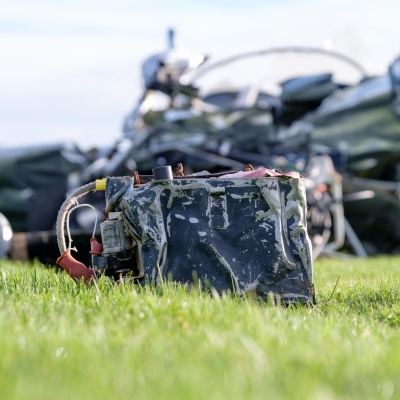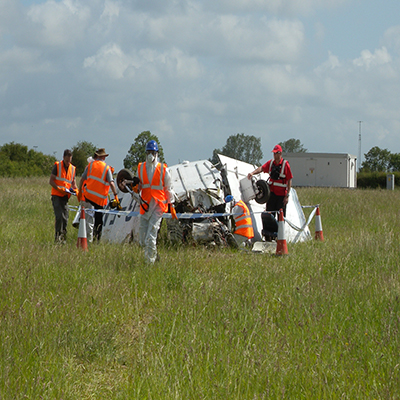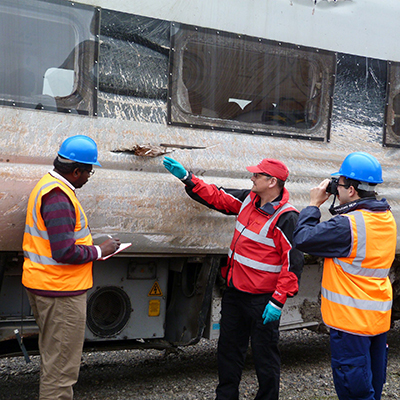“Please note: This course is normally scheduled to run in a hybrid format, allowing participation either online or face-to-face. However, for the December 2025 delivery, should the minimum number of face-to-face delegates not be met, the course will be delivered fully online to ensure it can still take place.”
Investigative interviewing is one of the key means of gathering evidence in support of a successful accident investigation. The ability to conduct effective interviews with a variety of different witness types is one of the core skills of an accident investigator.Interviewing Techniques for Accident Investigators adopts a balanced curriculum of theoretical learning and practical sessions involving interviews of live witnesses, with video debriefing, to deliver a practical learning experience supported by the latest academic thinking in investigative interviewing.
The course is intended to build on the interviewing skills developed during the Fundamentals of Accident Investigation, Applied Aircraft Accident Investigation, Applied Marine Accident Investigation and Applied Rail Accident Investigation courses. However, it can also be attended as a standalone course for delegates who wish to gain an enhanced qualification in investigative interviewing, and would be particularly suited to delegates with previous experience of conducting investigative interviews.
The course will have an emphasis on interviews forming part of safety (no blame/just culture) investigations of generic transport accidents. However, its content will be equally applicable to accident investigators from other safety critical domains and high reliability organisations, such as healthcare, process industries, and energy utilities.
At a glance
-
- Dates
-
- Please enquire for course dates
- DurationFive days
- LocationHybrid
-
Cost
£2,215 The course fee includes refreshments and lunch during the day. Accommodation is not included and must be booked separately.
Course structure
Lectures and practical interview exercises. Interview sessions will be recorded and analysed in order to learn from each event.What you will learn
- Demonstrate an understanding of the underlying interviewing theories, including memory theory and psychological factors affecting witness recall, and biases and heuristics of both witnesses and investigators.
- Describe and critically assess the most appropriate interview technique(s) to be adopted during an accident safety investigation to ensure the effective gathering of witness evidence, including cognitive/non-cognitive interview techniques.
- Develop an appropriate and effective interview strategy and plan to ensure the efficacy of the interview and optimise the gathering of the available information.
- Conduct an effective witness interview with regard to the selection of the most appropriate interview methodology, the welfare of the witness, the quality of the evidence collected and the accuracy of note taking.
- Develop an awareness of the characteristics of potentially vulnerable witnesses and the challenges faced when interviewing them.
- Demonstrate the ability to conduct an effective self-critique of the interview process to ensure continuous performance improvement.
Core content
- Refresher of the fundamentals of investigative interviewing:
- Basic principles of investigative interviewing.
- Basic interviewing models:
- Conversation Management.
- Conducting a PEACE interview.
- Use of different questioning techniques.
- Fundamentals of cognitive interviewing.
- Basic theory of memory and recall.
- Enhanced theory of investigative interviewing
- Enhanced theory of memory and psychology.
- SE3R methodology for managing and recording interviews.
- Introduction to concept of enhanced cognitive interviewing.
- Biases and heuristics – investigator and witnesses.
- Introduction to non-cognitive interview techniques.
- Preparation for the interview
- Assessment of witnesses’ emotional and psychological state.
- Awareness of the characteristics of potentially vulnerable witnesses and the challenges faced when interviewing them.
- Consideration of cultural, religious, social factors that may have an effect on the witness interview.
- Strategies for planning and structuring different interviews.
- Identification of the most appropriate interview technique.
- Conducting the interview
- Management of the initial phases of the interview.
- Implementation of the appropriate interviewing model in accordance with the interview strategy/plan.
- Adopting a strategy for recording witness evidence.
- Introduction to strategies for dealing with challenging/difficult witnesses, including obstructive and inappropriate behaviour.
- Identifying and employing appropriate challenge techniques.
- Dealing with other third party attendees at the interview, e.g. legal and trade union representatives, friends/family.
- Effective interview closure strategies.
- Post-interview phase
- Recording and summarising of the interview information.
- Strategies for conducting an effective self-critique of the interview process.
- Recording and summarising of the interview information.
Upgrade to a professional qualification
All of the short courses within the Safety and Accident Investigation Centre are available as standalone courses. Our postgraduate programme in Safety and Accident Investigation allows you to combine many of our courses towards a part-time postgraduate qualification.
Set A (choose one)
Applied Aircraft Accident Investigation.
Applied Marine Accident Investigation.
Applied Rail Accident Investigation.
Applied Road Accident Investigation.
Set B (take all three)
Interviewing Techniques for Accident Investigators*.
Investigating Human Performance*.
Analysis Techniques for Accident Investigators*.
Set C (10 credits each unless specified)
Applied Aircraft Accident Investigation (30 credits).
Applied Marine Accident Investigation (30 credits).
Applied Rail Accident Investigation (30 credits).
Applied Road Accident Investigation (30 credits).
Interviewing Techniques for Accident Investigators*.
Investigating Human Performance*.
Analysis Techniques for Accident Investigators*.
Crisis Management and Business Continuity*.
Human Factors in Aviation Maintenance.
Flight Data Monitoring.
Aviation Safety Management.
Safety Assessment of Aircraft Systems.
Introduction to Aircraft Structural Crashworthiness§.
* non-transport specific
§ module from different School
Who should attend
All those involved in the investigation of accidents and likely to be involved in the interviewing of witnesses.
The course will have an emphasis on the safety investigation of transport accidents. Its content will also be equally applicable to investigative interviewing for other safety critical domains and high reliability organisations, such as healthcare, process industries, and energy utilities.
Accommodation options and prices
This is a non-residential course. If you would like to book accommodation on campus, please contact Mitchell Hall or Cranfield Management Development Centre directly. Further information regarding our accommodation on campus can be found here.
Alternatively you may wish to make your own arrangements at a nearby hotel.
Location and travel
Cranfield University is situated in Bedfordshire close to the border with Buckinghamshire. The University is located almost midway between the towns of Bedford and Milton Keynes and is conveniently situated between junctions 13 and 14 of the M1.
London Luton, Stansted and Heathrow airports are 30, 90 and 90 minutes respectively by car, offering superb connections to and from just about anywhere in the world.
For further location and travel detailsLocation address
Cranfield UniversityCollege Road
Cranfield
Bedford
MK43 0AL
How to apply
To apply for this course please use the online application form.
Read our Professional development (CPD) booking conditions.



